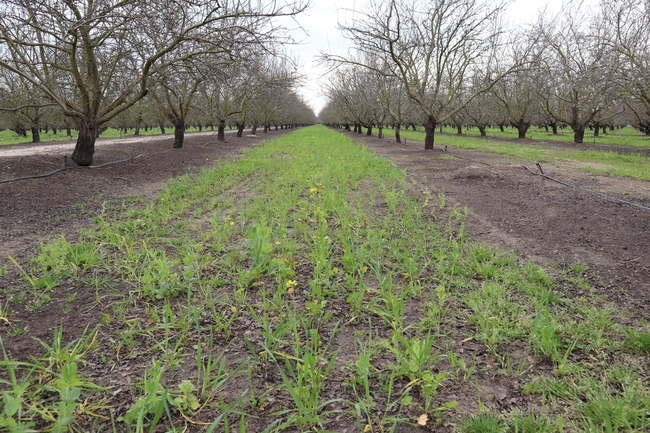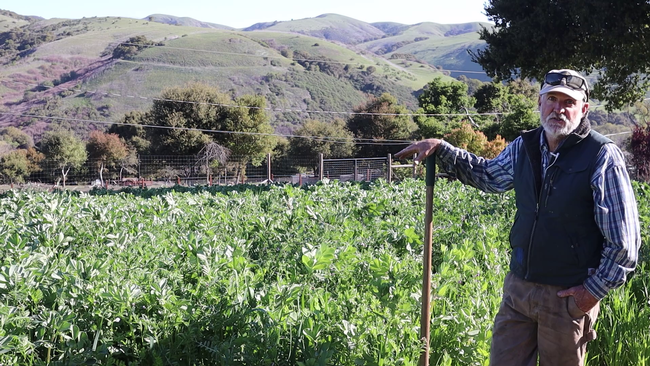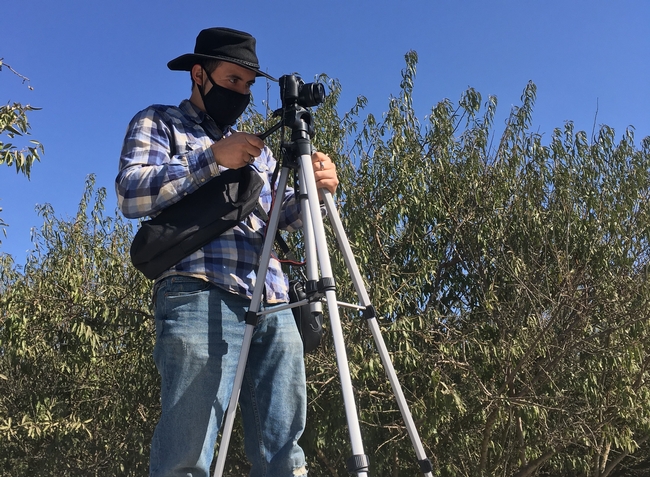
Posts Tagged: urban agriculture
UC offers resources for urban farmers at EcoFarm
University of California scientists will be participating in the 44th Annual EcoFarm Conference Jan. 17-20 in Pacific Grove. EcoFarm participants gather to celebrate and learn about advances in farming and food systems throughout the state. This year, the three-day conference will highlight Black, Indigenous and People of Color communities that depend on agriculture, while also showcasing the new technological advances that further the development of agriculture.
Researchers from the UC Davis Veterinary Teaching Hospital's Department of Population Health, the Western Institute of Food Safety and Security and UC Agriculture and Natural Resources will be attending the conference to highlight the importance of food safety and technical skills in urban farming.
At EcoFarm, the Western Institute of Food Safety and Security will showcase its Civic Urban Farmer Program with an exhibit. The program, led by UC Davis assistant project scientist Sara Garcia and supported by UC Cooperative Extension, strives to uplift BIPOC communities.
The Civic Urban Farmer Program
The Civic Urban Farmer Program – a no-cost, 11-week program for farmers in the Sacramento region and Bay Area – provides technical support for new and upcoming urban farmers through webinars and in-person events. The program is available for any race, gender, age and skill ability, and seeks to provide safe, expert advice for farmers at any scale.
Soil health, composting, pest management, business marketing, food safety and urban policy are among the topics covered in its lecture-style classes.
Earlier this year, the program graduated its second cohort, with the support of two nonprofit organizations, Three Sisters Gardens in West Sacramento and Common Vision in Oakland. The program is supported by industry professionals, researchers and government officials, as well as local nonprofit and non-governmental organizations.
Elina Niño, UC Cooperative Extension specialist in apiculture, joined the Civic Urban Farmer Program to support urban farmers with training on managing pollinators to increase crop yields and create value-added products such as honey. The success of the pollinator program revealed that small urban farmers desire resources and education that are tailored specifically toward the cultivation of healthy and safe food.
For more information about the Civic Urban Farmer Program, visit https://www.wifss.ucdavis.edu/urbanfarmers.
Organic Agriculture Institute
The UC Organic Agriculture Institute, led by UC Cooperative Extension specialist Houston Wilson, will have an exhibit at EcoFarm. UC Organic Agriculture Institute brings together growers, certifiers, consultants, community groups and other stakeholders with UC research and extension personnel to share information about organic farming.
For more information about the UC Organic Agriculture Institute, visit https://organic.ucanr.edu.
Workshop speakers
Several UC Cooperative Extension advisors will be speaking at EcoFarm, including Richard Smith, UCCE emeritus vegetable crops advisor; Patricia Lazicki, UCCE vegetable crops advisor; and Margaret Lloyd, UCCE small farms advisor.
Connect with @ucanr on X, Instagram and LinkedIn.
Backyard chickens stay healthy with help from UC researchers, website
In recent years, there has been a rise in the number of backyard poultry farms as people have taken an increased interest in farming. With raising these animals comes new challenges in taking care of them and ensuring they stay healthy.
However, there is a gap between the needs of these small avian communities in Californians' backyards and the current services available that generally work for service large-scale poultry operations alone.
This is where Beatriz Martinez Lopez, professor of infectious disease epidemiology, and Alda Pires, associate professor for Cooperative Extension and agronomist, come into play. Both in UC Davis School of Veterinary Medicine, the two women work on projects addressing avian influenza, animal health and food safety needs of people raising backyard poultry and livestock.
“Alda has a lot of experience and her work is amazing,” said Martinez Lopez.
To better address the diseases and problems associated with raising birds in the California context, they completed a series of needs assessments to understand the animal health requirements of small farms and backyard chickens.
“It has helped us be more organized and structured in our outreach,” Pires said. “There is a need to apply simple, practical biosecurity plans that are adapted for multiple species to small-scale, backyard and diversified farms.”
Through a multistate project funded by the USDA National Animal Disease Preparedness and Response Program, they created a website, FARM PPE, for producers to easily access biosecurity plan templates and additional resources. PPE stands for prepare, prevent and evaluate to reduce disease risk.
“Our clients are benefiting from the structured network we created,” Pires continued. “This website project, FARM PPE, aims to improve uptake of biosecurity measures on small-scale farms, by focusing on farmers and other professionals, including extension educators and veterinarians.”
The website project also created several trainings for farmers and educators to generate consistent messaging for small-scale farms.
With backyard birds being one of the potential sources of the highly pathogenic avian influenza virus, it is important to understand how the disease could spread to commercial flocks. The major challenge of the project is the complexity of the human/wildlife interface and the difficulties in predicting where an outbreak may arise.
Together, Martinez Lopez and Pires have published several papers about modeling disease transmission, and the work yields valuable information about hotspots for targeting surveillance strategies and wildlife surveys.
Their professional partnership is rooted in their personal connection; the scientists met as graduate students in 2006 and were delighted to cross paths again at UC Davis.
“Our collaboration started with friendship and our common interests in epidemiology and animal health,” said Pires.
As exemplified by their own careers, Martinez Lopez and Pires stress the importance of networking, getting involved and taking risks.
“Invite farm advisors and outreach partners from the beginning of the process so that they are part of the team,” Pires said. “That way you can create solutions that will give them the knowledge and resources they need.”
Cover cropping season has begun: Free recorded webinars, demos available
Cover crops, typically planted in early fall, deliver a host of agricultural and conservation benefits. But many growers have gone away from planting them due to technical challenges and extra costs associated with the practice. In partnership with the Contra Costa County Resource Conservation District, two University of California Cooperative Extension advisors collaborated to support farmers' cover cropping efforts and reduce costs.
Kamyar Aram, UCCE specialty crops advisor for Contra Costa and Alameda counties, and Rob Bennaton, UCCE Bay Area urban agriculture and food systems advisor, developed online project content for a free educational series on cover cropping, which entails growing non-cash crops to add beneficial biomass to soils.
The series – comprising 10 webinars and five virtual farm-site visits – features UC farm and urban agriculture advisors and some of California's foremost experts on cover cropping. It helps growers overcome their hesitations about the practice, which provides benefits such as alleviating compaction, improving water retention and increasing organic matter and nutrients in the soil.“Our site visit videos include a diversity of cropping systems, operation types and scales, and levels of experience with cover crops, so we really capture a variety of perspectives,” Aram said. “Now, with the videos online, I hope that they will serve as tools for other farm educators, as well as a resource for growers directly.”
When the COVID-19 pandemic scrapped plans for in-person workshops and visits, the series organizers pivoted to online webinars, starting in fall 2020, which drew more than 150 participants. The recorded videos – which cover basic methods, financial assistance, tips for orchards and vineyards and more – expanded the potential reach and impact of the series far beyond Contra Costa County.
“Each video, whether it's a webinar recording or a virtual site visit, emphasizes different aspects, and the titles are designed to help viewers find the resources they are most likely to benefit from,” said Aram. “There really is something for everyone.”
In particular, the organizers of the series recognized the importance of including technical and extension support to urban and semi-urban farmers in the East Bay and beyond.
“We wanted to make sure to include practical support from fellow farmers that was both accessible and relevant to our diverse small and urban farmers,” said Julio Contreras, UCCE community education specialist. “This meant covering topics like seeding with spreaders or by broadcasting – using small equipment and machinery or no-till systems – and even cover cropping in planter boxes.”
Aram and Bennaton also credited their Contra Costa Resource Conservation District partners: Ben Weise, agriculture conservation manager; Derek Emmons, agriculture conservation coordinator; and Chris Lim, executive director.
The project, funded by a Specialty Crops Block Grant from the California Department of Food and Agriculture, was also made possible by the generous contributions of time and expertise from presenters and hosts of farm-site visits, according to Aram.
“I hope that the videos will enjoy a long life online; they really contain a wealth of knowledge,” he said.
The series is available for view at http://ucanr.edu/CoverCropsCoCo.
Drought hurts urban farmers, too
Extreme drought is changing agriculture across California — and urban farming is no exception.
Many community farms and gardens cultivate land owned by city or county departments, schools and private landowners. Lucy Diekmann, a UC Cooperative Extension urban agriculture and food systems advisor in Santa Clara County, says that how those institutions handle rationing or surcharges set by water retailers makes all the difference for urban farmers. Diekmann co-authored a 2017 study looking at how urban agriculture in Silicon Valley was affected by the last period of extreme drought.
For example, priced-based water conservation strategies had very different outcomes depending on the landowner. Diekmann and her co-authors learned that three-quarters of Santa Clara County's community farms had their water bill paid by a project sponsor such as a nonprofit or school, and the sponsor absorbed the increased costs. On the other hand, one city-run community garden raised fees by 27% in one year to discourage water use. Some gardeners either left, dropped off the waitlist or chose smaller plots.
Diekmann and her co-authors point out that a major challenge for water management in urban agriculture is the lack of data. Many community farms and gardens don't have their own meters.
"We recommend that cities and counties subsidize the cost of meters, give financial support for installing watering systems that support conservation, and offer irrigation training," Diekmann said.
Because the water landscape is so uneven for urban farmers — usually in ways that benefit well-resourced groups — Diekmann and her co-authors also write that “affordable, consistent water prices for all UA (urban agriculture) users” must be part of all cities' urban agriculture policy portfolios.
You can read Diekmann's full study at https://www.tandfonline.com/doi/full/10.1080/13549839.2017.1351426.
UC partners with Gotham Greens to advance indoor agriculture
Gotham Greens, a pioneer in indoor agriculture operating high-tech greenhouses across the United States, is placing its latest state-of-the-art greenhouse near UC Davis.
“We are building a Controlled Environment Agriculture Consortium to support and advance the indoor farming industry, grow more fresh produce on less land and create new jobs for Californians,” said Gabriel Youtsey, UC ANR chief innovation officer. “Gotham Greens is an anchoring partner of this research and industry collaboration that we hope will spur innovation, create a new indoor farming workforce and support industry growth.”
University of California Agriculture and Natural Resources and the UC Davis College of Agricultural and Environmental Sciences have entered into a partnership with Gotham Greens to advance research and innovation in the areas of indoor agriculture, advanced greenhouse technology and urban agriculture. The new greenhouse facility enables opportunities for Gotham Greens and the University of California system to collaborate on research and innovation focused on advancing the science, workforce, technology and profitability of indoor agriculture globally.
“We are proud to bring Gotham Greens to the West Coast and partner with one of the highest ranked agricultural research centers in the world to advance the entire agriculture system,” said Viraj Puri, Gotham Greens co-founder and CEO. “California is responsible for growing one-third of the country's vegetables and two-thirds of the nation's fruits, yet in recent years, issues surrounding drought, food safety and worker welfare have demonstrated the need for continued innovation. Gotham Greens offers consumers clean, safe and sustainably grown leafy greens, herbs and versatile, time-saving plant-based dressings, dips and cooking sauces.”
Located in Solano County, the first phase of Gotham Greens' 10-acre greenhouse facility is expected to open in 2021 and will enable the company to deliver fresh, greenhouse-grown leafy greens to more retailers, foodservice operators and consumers on the West Coast. The company operates one of the largest and most advanced networks of hydroponic greenhouses in North America, where the demand for indoor-grown produce continues to surge. Nearly a decade after launching the nation's first commercial-scale rooftop greenhouse, Gotham Greens continues to reimagine how and where fresh produce is grown across America.
“We're excited about collaborating with Gotham Greens, which is a coveted employer for tomorrow's leaders in agriculture and engineering,” said Helene Dillard, UCD CAES dean. “This partnership will offer our students the chance to learn best practices from leading experts in indoor farming.”
The greenhouse will generate 60 full-time jobs and provide students in the University of California system with an opportunity to learn firsthand from the industry leader. Gotham Greens recently raised $87 million in new equity and debt capital, bringing the fast-growing company's total financing to $130 million and fueling its next phase of growth.
"We are delighted for Gotham Greens to join Solano County's thriving agricultural economy and help to usher in a new era in farming innovation, job creation and economic growth for the region,” said Solano County Supervisor John Vasquez.
Gotham Greens owns and operates greenhouses in New York, Illinois, Rhode Island, Maryland and Colorado. Its products are currently available in more than 40 U.S. states and 2,000 retail stores.











